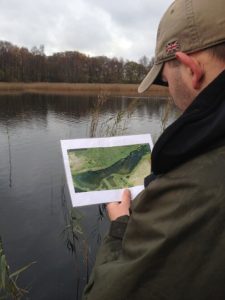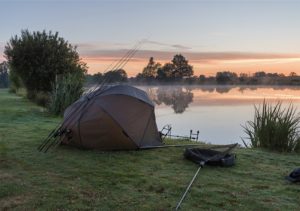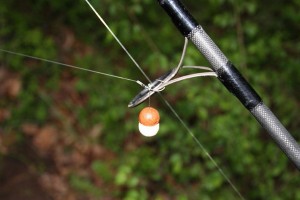Carp fishing is not rocket science. We are trying to catch a fish. But this fish is a master of its environment and can adapt extremely well to angler pressure, however with a little thought and effort though we can stack the chances back on our side.
Here then are my ‘Seven Secrets to Catching More Carp’. Apply these to your French carp fishing trip and see how you go…
1. Find your fish
This is an obvious one, but I would say overlooked by a large percentage of anglers. If you don’t fish where the carp are then you’ll not catch them. I have seen this time and again over the years. This can be fishing the wrong part of a lake or not exploiting your swim correctly.
I once fished a gravel pit outside Paris, where the fish were showing at well over 120 yards. I was casting hopelessly short, and the result was I landed one double figure fish while the Dutch anglers in the peg next to me had the session of a lifetime banking forty odd carp to 40lb plus. The lesson learned here was that I was not fishing on the fish.
Finding the fish when you turn up to a new venue can take a bit of trial and error but it is nonetheless imperative if you want to catch. Experience will give you a good base if the carp do not give their presence away.Finding the fish can also mean finding where they feed in your swim. This lesson was taught to me when I first read Rod Hutchinson’s “The Carp Strikes Back”. He was doing well on Savay fishing in gullies, while most other anglers were fishing on the bars.

2. Know your swim
It is then very important to know your swim. I’ve written before that a marker rod is an essential piece of my fishing kit. Yet I see so many anglers turn up without one. Even if you find the carp in a given area, they may not be feeding there. Finding a likely feature to present a bait on will considerably increase your chances of a take.
Again by way of an illustration I remember a few years back when I was fishing a Champagne gravel pit. I had chosen to fish the island margin at some 100 yards and had not had much success. I then decided to explore further my swim with a marker rod. I discovered a large gravel area some 40 yards from the bank, situated in the middle of a quite soft silt lake bed. This seemed a good bet for a run so I placed a rod on this area. I baited lightly with boilies and a few spods of hemp and pellets. Well the weekend produced five fish to just under 30lb and all bar one came from this firm area.

3. Bait correctly
Choice and application of bait is in itself a vast subject. But to just touch briefly on it. It can be the key to success or failure. To my mind you need to keep just enough food in the area so the fish are held and interested in feeding, but not too much that they have eaten enough before finding your hook bait. There can be a certain amount of trial and error here also.
I generally find that it is wise to start off with a light amount of bait. You can’t take it back out if you realise you have been fishing the wrong spot. If your choice proves to be the right one then you can always add some more feed to hold the fish. I have never been one to pile in a lot of bait and hope that the fish will come by. I have seen anglers doing this on waters like the Orient, but it really is all or nothing tactics.
4. Watch the water
Observation is again something few anglers really take seriously. But fish will show themselves and even on dull or rainy days a leaping carp can be a good place to start. This is the type of situation I wouldn’t immediately go in with a marker rod or a stack of bait. The best tactic I have found here is a small PVA bag cast to the area. Ok you’ll be going in blind, but it is worth a chuck to see if you can get a take.
I did this on one water having spent a while plumbing other parts of the swim for likely spots and carefully baiting the areas. A large carp head and shouldered far out to my right on a part of the swim I hadn’t considered. A PVA bag on this spot lead to 20 carp in a weekend, all off this one spot. Despite the appalling weather had I spent all day zipped up in my bivvy I’d mostly likely have blanked.
5. Be mobile
Now many anglers come to France and because they are away for a week they bring everything and the kitchen sink. I see loads of threads on the forums about large bivvies for France. Well what’s wrong with your brolly or Shelter you use at home? A massive dome tent that takes 30 minutes to put up and weights 10kgs is a real pain the derrière to move once you are set up.
Even for week long sessions the JRC Stealth I’ve been using is just fine. It goes up fast, in summer it is used just as a brolly with storm sides. Setting up a large camp that takes half a day to move is not the best way to remain mobile while fishing. There are times of the year when either the fish move out of your area, or you need to try a new spot to get a take.
I saw this while filming Shaun Harrison on a UK this winter. He changed swims for the last hour of the short day session and banked a fabulous 20lb Winter carp. Had he packed up early or just resigned himself to blanking, then that’s exactly what he would have done.

6. Adapt to the situation
It is not wise to have too stereotyped an approach to fishing. I see guys fishing the same rig, same presentation and same bait, whatever the situation, on the basis that it works on their home water so it must be right.
Different lakes have different make ups, the nature of the lake bed, the vegetation, the depth. There are just so many parameters. It might be that a pop up or a longer hook link will get you some more action. Changing small things like hair length or hooklink material might also change your results.
You need to analyse what you are doing, what you want your rig to do, in function of the type of water you are on. To blindly go in with the same tactics on all waters in not a good way to fish. Certainly use your standard set up as a starting point, but vary your presentation and rig set up on all rods to see if one proves more successful.
Don’t assume that boilies are the only bait. Particles and pellets can prove deadly in the right circumstances. If you venue has nuisances species like poisson-chats, that are so common in France, don’t simply avoid the water, but try to adapt you techniques to avoid catching these species.
Experimentation all the while is what separates the consistent anglers from the rest.

7. Keep your tackle maintained
Finally one needs to maximise the chances of converting the chances. I remember when I started out one of my friends, a very natural angler seemed to lose more fish than he banked. I took one look at his set up to see why. He had blunt hooks, old line and poor rigs.
While I don’t advocate changing a hook after every fish, I will do so on a regular basis or as often as is necessary during a session. If my hooklink is damaged I’ll tie a new rig. I inspect my mainline before every trip and if after a particularly hard fight I notice any damage I’ll strip off a few dozen yards until I get to good line. I always make sure I have enough new hooks, swivels and hooklink material in my tackle wallets. I can’t think of a more frustrating set of circumstances than running out of end tackle. This all boils down to attention to detail.
I think it was Terry Hearn who said it’s all about percentages: if some small, seemingly insignificant detail can increase your chances by 1%, you add up all the 1%’s that the above list gives you and you’ll catch more fish. It is simply probability.
Find more useful carp fishing tips over on this section of the blog here – Tactics and Watercraft

[…] Seven Secrets to Catching Carp […]
A very straight forward yet informative article.Fairly new carpie and after this read my marker float is heading to the bank,with your advice to improve my catches,cheers
a very informative piece of fishing advice.one thing i always do is change my hooks and rig after every session.i havent tried marker floating as of yet but after reading your article maybe its time i did.im new to carp fishing and welcome any useful advice to help me catch.thanks alot.
It is Covid 19 lock down in SA. Winter has just blown in and this article is ast imeous as you can not believe. I am living next to a river teeming with carp, but it seems like I was fishing in the wrong areas. Thx for your insights, it will now be put to the test. 29 April 2020 is my new start in carp fishing.
No problem, enjoy your fishing!